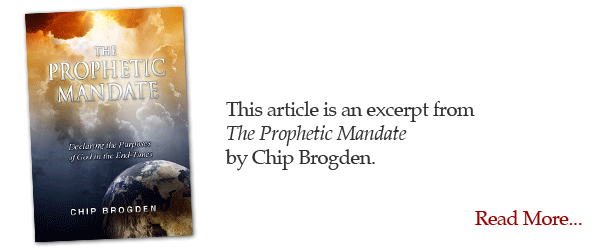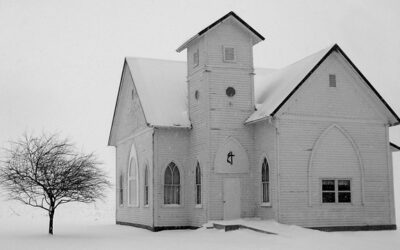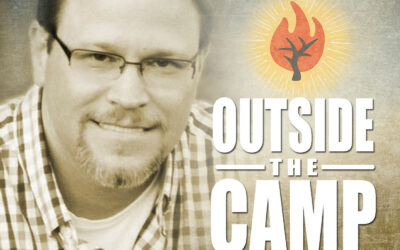There are larger issues which need to be prayerfully examined, including the sovereignty of God, His judgment on the world, His dealings with the Church, the doctrine of dual-citizenship Christians have with the Kingdom of Heaven and the nations of this world, the eschatological considerations to be made (if any), and so forth. We have already noted that we, as the Church, cannot continue to ask God to bless our unacceptable worship. Thus, there is something paradoxical in the song “God Bless America”. Can God really bless America, and do we really have the right to sing this song? To wrestle with these issues and come to an understanding of them requires more prayer and more words than we can do justice to at this time.
The issue of God sending judgments upon this world or upon this country in order to punish us is something which, admittedly, brings forth a personal response from us. We have lived through two major hurricanes, the last of which resulted in a flood which destroyed two houses in our immediate family and came very close to destroying our own. We have witnessed the devastation, the death, and the smell of it first hand. We have seen the inconsolable woman collapse to the ground, crying over and over, “They can’t find my babies! They can’t find my babies!” And of course, the inevitable questions which arise: did God cause this? Why did He allow it? Is God in control? Are we being punished? Why pray at all? So we have had the benefit of wrestling with these issues for two years, whereas some are only beginning to. By this time, everyone is wrestling with these issues, so this is a critical time in our individual history with God.
The following commentary does not attempt to address all of these issues. It was, and is, directed towards those who come along, while dead bodies are still being recovered, and try to establish themselves as a “prophetic voice” at the expense of human suffering. It is also directed towards those who, without thinking, forward these “prophecies” around and thus perpetuate their error and add to the confusion. Most of these “oracles”, and the ones who take issue with our stand against them, believe that the Day of Grace is over for this world, and for the United States in particular. We respectfully disagree! The fact that the Church remains in the earth as “salt” and “light” means that the Day of Grace is still here. Like Jesus, as long as we are in the world, we are the Light of the world, and we should work while it is Day, because the Night IS coming when it will be impossible to work (John 9:4,5).
The following attempts to give some general principles as to why someone with an “I told you so!” attitude is prima facie evidence that God has not spoken through them. Finally, it makes the point that a true prophet will know how to proclaim judgment and intercede against it at the same time. This apparent contradiction only underscores the need for wisdom, maturity, and prophetic responsibility, because it is certain we have not seen the last of trouble on the earth.
In Defense of God
“And when His disciples James and John saw this, they said, ‘Lord, wilt thou that we command fire to come down from heaven, and consume them, even as Elijah did?’ But He turned and rebuked them, and said, ‘Ye know not what manner of spirit ye are of. For the Son of man is not come to destroy men’s lives, but to save them.’ And they went to another village (Luke 9:54-56).”
It is disheartening to observe how some within the so-called “prophetic community” will come forth in a time of natural disaster or human catastrophe and try to establish their credibility on the basis of some “word” of judgment which they purport to have received from the Lord in connection with the event. At best, it is inappropriate and inconsiderate to those who have suffered great loss; and at worst, it is morally, ethically, and prophetically irresponsible.
There are three important points to be made in this passage of Scripture which provide a standard by which we may reasonably measure a man or a woman who claims to speak on behalf of the Lord. It is hoped that this will provide some direction to those of us who are being inundated with “words” and claims of alleged prophetic significance.
May We Consume Them As Elijah Did?
The disciples tried to apply something of the spirit and power of Elijah to their own situation, but they were out of step with the Lord and His Purpose. Jesus could not, and did not, give them permission to do what they asked. They misunderstood their new role in a new Kingdom. What they failed to understand was that God’s dealings with man had entered into a new season, a new time, marked by grace, not judgment. The incarnation of Christ saw the beginning of a new dispensation of grace. In this season they were not permitted to call down fire from heaven to consume anything. The request that they be permitted to do so was met with a sharp rebuke from the Lord Jesus.
It is not that Elijah was wrong. Elijah was right for the season in which God placed him. But disciples of the Lord Jesus cannot do as Elijah did. One does not look for snow in the summer, or green leaves in the winter. “To every thing there is a season, and a time to every purpose under heaven (Ecclesiastes 3:1).” We know that there is a future judgment that God will bring upon the whole world, but that time is reserved for the very end and only after every means of grace has been exhausted.
It is a mistake to attach prophetic significance to every catastrophe which happens and label it as a judgment from God, especially if we are doing it in such a way as to lend credence to our own selves as “oracles” or “prophets”. Clearly, the ones who do this serve their own interests and not the interests of God. We are not in the business of saving the Church and judging the world; we are in the business of saving the world and judging the Church, and the Church is where God’s judgment begins, not the world (I Corinthians 5:12,13; I Peter 4:17).
There is a fine line, that we dare not cross, between saying God permits something to happen, and God causes something to happen. In times of natural calamity or in cases of man’s inhumanity to man, God can and will and does use these events to draw men to Himself, and He will often directly intervene in these events in order to minimize, or otherwise reduce, the negative impact such events may have. It is presumptuous to think that He sends such events upon the world today in order to “pour out” His wrath. To claim otherwise is be inconsistent with this season of God’s dealings. To attribute the evil acts of evil men to something God is doing to teach us a lesson is to grossly mischaracterize and misrepresent God, and it ought to stop.
This does not preclude a factual presentation of future trouble, but it should be tempered with God’s desire for repentance and restoration. For instance, we know that perilous times will come, and we know that men’s hearts will fail them for fear, and we know that in this world we will suffer persecution. These are Scriptural facts: are they not sufficient all by themselves? Why must each specific calamity be individually called forth and predicted? Or why must someone allege its “prediction” after it has already occurred? It serves no useful purpose, and is not consistent with our role as ambassadors of Christ, peacemakers between God and man.
“Ye Know Not What Spirit Ye Are of”
Now the second thing we want to examine is the spirit and timing in which these “prophetic” words, visions, and dreams come forth. There is a palpable sense of “I told you so!” one gets when reading these reports which, invariably, rise to the surface and become well-known only after the disaster has already happened. It seems as if the ones who forward these writings are almost gleeful at seeing something come to pass which (in a general sort of way) seems to indicate that a “true word” had been spoken. What purpose does it serve, now that the “judgment” has already occurred? Are we now supposed to bestow some kind of honor or service upon these prophets of destruction in order to validate them somehow?
We should question the validity and genuineness of any prophetic opportunist who elevates “their” word with such presumption and pride. It indicates, among other things, that they have done NOTHING to intercede against the very thing they have declared. If in fact God did reveal it to them, they failed to grasp that the proper response to the revelation was not mere proclamation, but intercession – and this is what truly separates a genuine prophet from a prognosticator and fortune teller.
If it was wrong for Jonah to become angry when his word of judgment DID NOT come to pass, how can it be right for someone to be happy when their word of judgment DOES come to pass? This assumes, of course, that the Lord spoke to them in the first place, and that, in and of itself, is highly suspect. Either way, whether the word is correct or not, the spirit is wrong.
At least Jeremiah wept when he announced the coming judgment upon Jerusalem. He lamented the coming to pass of his word, recording his grief in the Book which is so appropriately named Lamentations. What a contrast between Jeremiah and today’s “prophets”. The “Sons of Thunder”, James and John, were rebuked for having the wrong spirit, the wrong motivation, and the wrong perception of their role in God’s Kingdom. They were zealous for the Lord Jesus and for the things of God, but they were deceived by a wrong spirit, and they were not in a position to even know to what extent this wrong spirit had influenced their heart, their thinking, and their speech towards others. If this is our condition then we should repent and ask God to create in us a clean heart, and to renew a right spirit within us (Psalm 51:10).
“The Son of Man is Not Come to Destroy, But to Save”
Like many of you, I am praying daily for God’s Kingdom and God’s Will to be accomplished in the earth. As I prayed it this morning in conjunction with the events of the last few hours I must say that it was with a new-found respect for the very words I am uttering to God in prayer. The aspects of God’s strategic and tactical Will are as vast as the universe and as narrow as the personal interest in the lives of each soul living on the earth, to the extent that the hairs on their head are all numbered.
It is clear that a large part of God’s strategic, overall, universal Will in this present age has to do with saving lives, not taking lives. Hence the apostle Paul writes:
“I exhort that, first of all, supplications, prayers, intercessions, and giving of thanks, be made for all men; for kings, and for all that are in authority; that we might lead a quiet and peaceable life in all godliness and honesty. For this is good and acceptable in the sight of God our Savior; WHO WILL HAVE all men to be saved, and to come unto the full-knowledge [epignosis] of the Truth [Christ] (I Timothy 2:1-4).”
The epignosis of Christ, that is, the full, complete, experiential, revelation of Jesus as He in fact is, the reality of Him as All in All, is the Divine Goal of God for all men. We, who are supposed to know the Truth, are called upon to offer supplications, prayers, intercessions, and giving of thanks towards this purpose, that God’s Will would be done on the earth. Proclamation without the accompanying intercession accomplishes little for God’s Kingdom.
Clearly, it is NOT God’s Will that any should perish, but that all should come to repentance (II Peter 3:9). It is THE DEVIL who is a murderer from the beginning, who comes to kill, steal, and destroy. On the other hand, it is the Lord Jesus Christ Who is come that we may have abundant life (John 8:44; 10:10). The Lord is more longsuffering than some of His “spokespeople” would have us to believe.
Our Response
The issue of who is or who is not prophetically gifted should be the very last consideration for us during these important days. Instead, we should humble ourselves with prayer, and with fasting, asking the Lord to reveal His Son to us in an ever increasing way. If we would seek God for ourselves we would not need a prophet to confirm everything for us. At stake is the Testimony of Jesus, and right now that Testimony is broken down, due in part to the confusion and immaturity of the Church, and further complicated by a myriad of voices speaking on behalf of God when God has not sent them. We need to know God for ourselves before we can properly represent Him, or speak on His behalf, to the rest of the world.
–September 12, 2001













